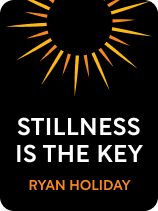

This article is an excerpt from the Shortform book guide to "Stillness Is the Key" by Ryan Holiday. Shortform has the world's best summaries and analyses of books you should be reading.
Like this article? Sign up for a free trial here.
How do you still an agitated mind? What exactly is meant by quieting your mind?
When your mind is quiet, you can process information faster, reason more rationally, and solve problems more effectively. In his book Stillness Is the Key, Ryan Holiday likens this state—which he calls “stillness” to the state of satori in Buddhism.
Keep reading to learn about the power of a quiet mind, according to Ryan Holiday.
What Is Stillness?
Stillness isn’t the literal absence of physical motion. Rather, Holiday explains that it’s a perceptible state of mind that exists in the absence of physical, mental, or emotional chaos. Stillness is a state of a quiet mind, contentment, peace, awe, love, fulfillment, and brilliance. Holiday likens the power of stillness to “satori,” an experience of deep insight and awakening, or a state of enlightenment.
(Shortform note: According to Buddhists the state of satori is actually our original, natural state, to which we can return through the practice of meditation. Buddhists believe that of all living creatures, only humans have strayed from this original enlightened state of being.)
Additionally, stillness is a state of being that gives you strength and courage to deal with adversity and difficulty. For example, Holiday says stillness was the quality that allowed Anne Frank to endure the horrific experience of persecution in Nazi Germany with such grace and peace of mind.
(Shortform note: Perhaps the most remarkable quality Anne Frank possessed was her ability to maintain optimism in the face of unimaginable horror. Psychological research has shown that maintaining a positive outlook is the single greatest predictor of how resilient one is in adversity.)
Holiday assures us that stillness is accessible to everyone at any time, but that doesn’t mean it’s easy to access—it requires substantial practice and discipline. Even when we do experience stillness, he says, we often only experience fleeting moments of it. You must keep practicing to get to a point where it’s consistently maintained and readily accessible to you.
Calming the Muddy Waters of Your Mind
Throughout our lives, we’re all bound to face crises of some kind and we’ll come through them much better if we know how to approach them with stillness, rather than reacting in an emotionally charged way. In addition to dealing calmly and effectively with challenges, cultivating stillness in your life allows you to have breakthrough moments of inspiration and genius.
To better help us understand how stillness leads to breakthroughs, Holiday uses a metaphor taken from the Chinese philosophy of Daoism (or, Taoism). He says to think of your mind as a pool of muddy water. As thoughts churn, the mud does too. When you allow the muddy water to become still, the mud settles to the bottom and the water becomes clear. This allows you to see what is deeper under the surface. Beautiful fish, plants, and rocks that were previously obscured by the mud become visible. The same goes for our minds. When we learn to calm the chatter, worries, and petty concerns, our minds become clear and we’re able to access the deeper thoughts, insights, and inspiration that are normally obscured by the “mud.”
(Shortform note: A sacred text of the Taoist tradition, the Tao Te Ching, says the Tao is the natural order of the universe, to which we’re all connected on a deep, spiritual level. However, we often lose our connection with it and need to practice simplicity, patience, and compassion to find it again. Practicing simplicity means not pursuing worldly possessions, power, and other superficial achievements. Instead, we should let go of ambition, as our worldly ambitions distract us from the deep peace of the Tao.)
Although Holiday describes stillness as a state of mind, he also emphasizes that the mind cannot achieve stillness without being in tune with the body and soul. He says these three dimensions of ourselves are inseparable, so he gives us instructions for how to cultivate stillness in each.

———End of Preview———
Like what you just read? Read the rest of the world's best book summary and analysis of Ryan Holiday's "Stillness Is the Key" at Shortform.
Here's what you'll find in our full Stillness Is the Key summary:
- Why stillness is not just the absence of motion
- How to cultivate stillness in your mind, body, and soul
- Why you should start ignoring the news






